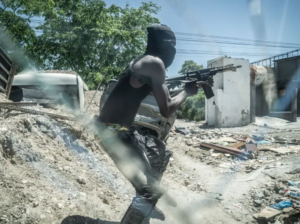The Deployment of Kenyan Forces in Haiti
When gang violence in Haiti escalated, the Haitian National Police (PNH) asked for assistance from Kenyan police personnel, who were sent to help restore order. There was a lot of optimism and enthusiasm for this UN-sponsored mission. The Kenyan forces are under increasing pressure and frustration as six weeks into their deployment; the ground reality has shown to be significantly tougher than expected.
Contingent from Kenya Arrives
The initial contingent of two hundred highly trained Kenyan police officers touched down in Port-au-Prince, Haiti’s capital, on June 25, 2024. Bravely waving the Kenyan national flag, the men and women donning helmets and battle gear stepped off the Kenyan Airways plane. As they gathered to face the difficult mission ahead, they were encouraged by chants in Swahili. Three weeks afterwards, the Kenyan contingent was reinforced even further by a second group of 200 officers.
The PNH had been fighting a losing battle to stem the tide of criminal gang-organized violence in Port-au-Prince and the rest of the nation when the Kenyan police were sent to provide a hand. As part of a UN-mandated multinational force to stabilize the country, Kenyans were to lead the charge.
Particularly outspoken in their disapproval were local news sources. Although the Kenyan police were there, the gangs’ violence persisted, according to AyiboPost and Le Filet Info, two significant Haitian news outlets. AyiboPost questioned the Kenyans’ apparent hesitation to take strong action against the gangs.
Rameau Normil, chief of police in Haiti, and Godfrey Otunge, commander of the Kenyan force, sought to reassure the public in the face of mounting criticism. A hundred “bandits” were reportedly murdered in coordinated operations carried out under the auspices of a state of emergency. Nevertheless, the public remained skeptical and doubted the validity of the assertions, notwithstanding these remarks.

UN experts warned earlier this year that gangs had more firepower than Haiti’s police
Interim Prime Minister Garry Conille of Haiti recognized the difficulties encountered by the Kenyan military. He thanked them for their help but also acknowledged that aid was moving at a snail’s pace, which was making Haitians angry. By stressing that the Kenyan officers had followed all applicable Haitian regulations and protocols, the prime minister justified their deployment. The Kenyans, he emphasized, were not there to conduct their own operations but rather to assist and accompany the Haitian police.
Kenyan Reaction and Initiatives in Public Relations
In mid-July, the Kenyan contingent established an official social media account to facilitate the management of the narrative surrounding their mission. Daily reports on their actions, such as dignitary visits, human rights training, and patrols in Port-au-Prince, were delivered through this website. According to the story, things are looking up with “significant success” and a “gradual return to normalcy.”
Sadly, many Haitians did not connect with this optimistic message. Given the ongoing violence and instability in the country, the people saw the stories as excessively hopeful, if not downright propaganda. People were already unhappy and skeptical, and the gap between the official story and what was happening on the ground really made things worse.
Last Thoughts on the Kenyan Haitian Mission’s Future
For a nation devastated by gang violence, the deployment of Kenyan police to Haiti was meant to shine a light of hope. The difficulties they’ve faced, however, show how intricate the situation is and how little help outside forces can provide for long-standing problems.
The increasing dissatisfaction and criticism highlight the critical importance of swifter responses and concrete outcomes. Restoring stability to Haiti will need a reevaluation of current tactics by the Haitian government and the international community in their fight against gangs. A more planned and successful strategy is essential for the success of the Kenyan contingent, who continue to play an important role in this endeavour despite the failures.
As the Kenyan forces continue to negotiate the treacherous terrain of Haitian security, the strain on them will only grow in the weeks and months ahead. What happens to Haiti and other attempts to bring peace to the area will depend on how well they adjust to new circumstances, take criticism, and carry out their objective.



















